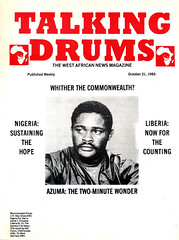Book Review...
Fanning the tribalist sentiments
Title: Classes and Tribalism in Ghana
Author: Ansah Asamoah
Publisher: Information Services Department, Accra
Apart from Dr Kwame Nkrumah's celebrated 'Class Struggle in Ghana' no serious efforts have been made to analyse 'classes' in Ghanaian politics. A factor responsible for some of the dangerous tendencies in Ghana's history where the present PNDC government have exploited the enthusiasm of the youth and students and the over- zealousness of some so-called radicals. But what is most amazing is that even though Rawlings seems to be repudiating his earlier rhetoric, denying the essence of class struggle, and praising those he has blamed in the past for Ghana's ills, his close allies are still engaged in the art of deception.His close friend Kofi Awonnor was the first to hit the headlines with his book "The Ghana Revolution" where he virtually declared that the 'Rawlings' revolution is an "Ewe" revolution. The fact that the regime has not denied that it accepts the Awoonor thesis, confirms fears that the regime is unabashedly tribalist. Nothing confirms this more than the work under review. But what makes this piece even more dangerous is the way it seeks to transpose Marxist analysis without any critical appraisal of the Ghanaian society. Indeed, Marx warns of this danger, and it is surprising that the professor of sociology ignored it altogether. Ansah Asamoah's thesis is based on the unilinear analysis which has the tendency of uncritical acceptance of the five stages of social development. He follows this with a categorisation of classes in Ghana as Bourgeoisie (national, comprador petty, proletariat, peasantry (middle lower), elite. Perhaps the destructive economic policies of the regime is founded on Ansah Asamoah's confused analysis.
If it is true that the national bourgeoisie has "been dangerously preventing the development of the forces of production" then how can the government under which he is serving be courting members of this class? Ansah Asamoah's distinction between the 'national' and petty bourgeoisie is not very clear and is ever confusing. To him, what distinguishes the two is that the national bourgeoisie depends on 'hired' labour while the 'petty' bourgeoisie depends on 'its own labour'. This is inadequate and leads him to listing small time economic enterprises like Nkulenu Manufacturing Enterprise, Opoku Transport, and Mankoadze Fisheries as examples of a national bourgeoisie. Interesting enough, Mark Kofie is absent from his categorisations.
Nowhere does the professor exhibit academic dishonesty than when he discusses tribalism in Ghana's politics. He sees only one form of 'tribalism' - Limann's tribalism. He claims that Limann "made structural and functional changes within the various units of the armed forces in favour of certain ethnic groups" (Northerners?) and distributed "leaflets against a nationality" (Ewes). Another example he gives of tribal conflicts is the Kokomba Nanumba crises. Nowhere does he discuss the weak secessionist attempts made by a section of the Ewes, the Alavanyo-Nkonya conflict which Ansa Asamoah must be aware of.
He does not answer charges of tribalism levelled against the Rawlings regime. Since late 1982, the tribal balance of the government is heavily Ewe and the latest appointment of Brigadier Quainoo and Capt. Tsikata, and Col Ewa confirms fears that the Rawlings regime is the only one in Ghana's short history to be unashamedly tribalist.
Rawlings himself admitted this in his 1983 speech when he said that the conflicts in his regime were because some of the principal actors came from areas affected by "oppressive structures: farm lands taken away from their parents, forced migration experiences, a decay in tribal and social relations, etc." It is therefore clear that the pamphlet does not address itself to the most pertinent questions that readers would have expected of him.
Obviously Ansah Asamoah is one of those who are yet "to extricate themselves from the claws of tribalism".
For any nation that values its survival, tribalism of the type which Rawlings and his kinsmen are involved in is very dangerous. In Chad it has torn the country apart. In Ansah Asamoah's own admission, "flirtation with tribalism has not been able to prevent the fall from power of those who use it to divide the people… tribal solidarity cannot thrive on empty stomach". It is a timely warning which Ansah should sound to his mentor.
No work of the present confirms the dangerous tendency being nurtured by this regime more than the one under review. To use the Information Services Department to promote this kind of work is even more dangerous. How many Ghanaians can be allowed to use state facilities to promote their brand of wishful thinking? Perhaps it confirms the view that only cousins and tribesmen have power in Ghana today. The piece has only added to the confusion about classes and tribalism in Ghana's history. But at least, it opens up avenues for debate.
